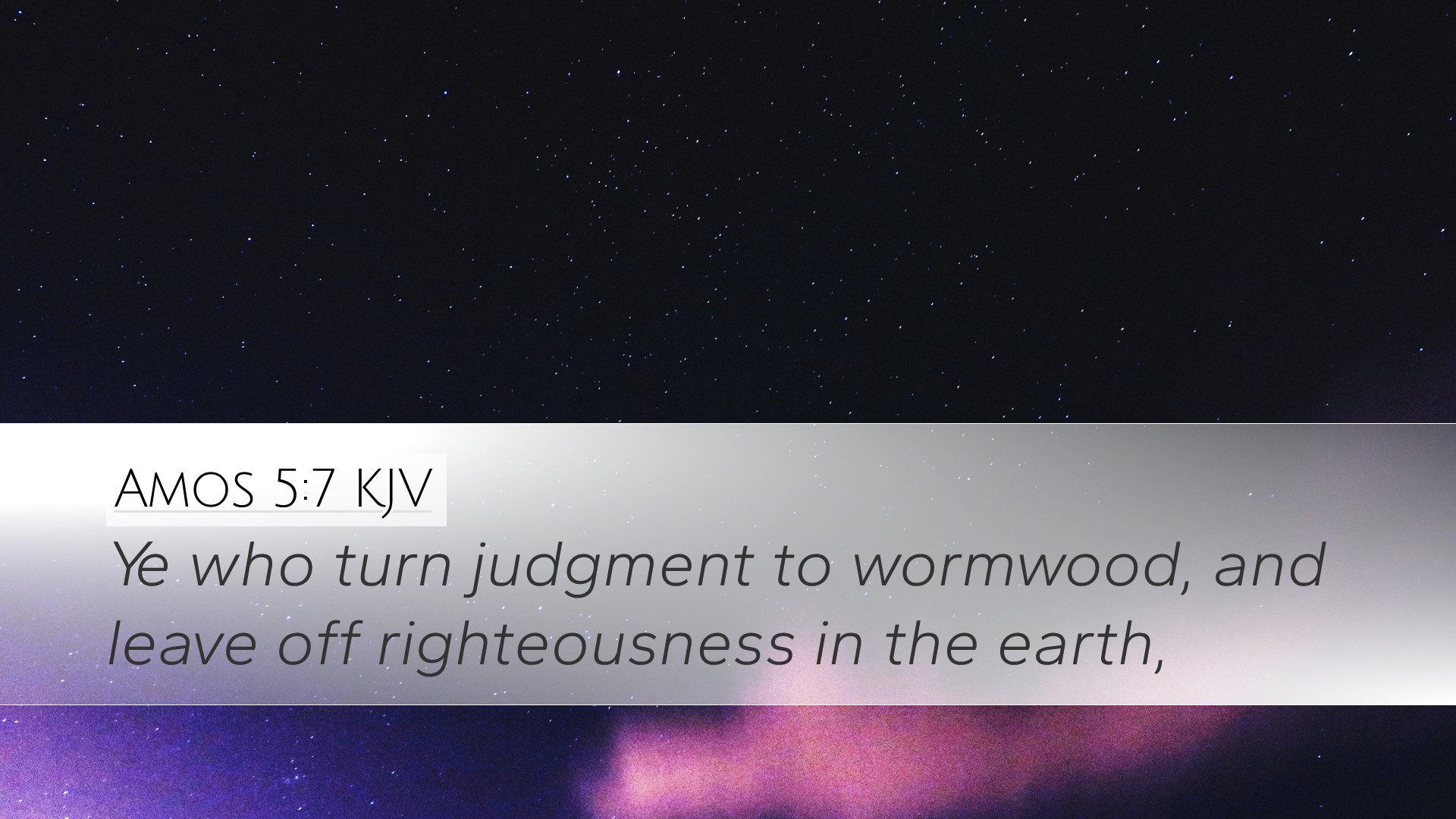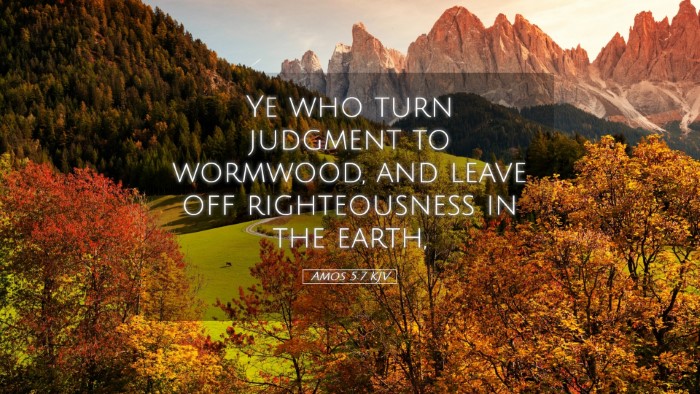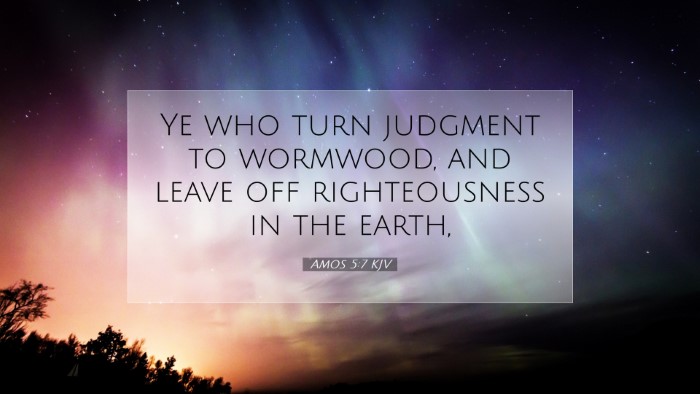Old Testament
Genesis Exodus Leviticus Numbers Deuteronomy Joshua Judges Ruth 1 Samuel 2 Samuel 1 Kings 2 Kings 1 Chronicles 2 Chronicles Ezra Nehemiah Esther Job Psalms Proverbs Ecclesiastes Song of Solomon Isaiah Jeremiah Lamentations Ezekiel Daniel Hosea Joel Amos Obadiah Jonah Micah Nahum Habakkuk Zephaniah Haggai Zechariah MalachiAmos 5:7
Amos 5:7 KJV
Ye who turn judgment to wormwood, and leave off righteousness in the earth,
Amos 5:7 Bible Commentary
Commentary on Amos 5:7
Amos 5:7 (ESV): "O you who turn justice to wormwood and cast down righteousness to the earth!"
General Context
The Book of Amos is a prophetic work attributed to Amos, a shepherd called to prophesy to the Northern Kingdom of Israel during a time of relative peace and prosperity. Despite this outward calm, the moral and social fabric of society was disintegrating. Amos speaks vehemently against the social injustices and spiritual complacency prevalent in Israel.
This verse plays a crucial role in illustrating the overarching themes of justice and righteousness, key components of God’s covenant relationship with His people.
Verse Analysis
In Amos 5:7, the prophet laments the perversion of justice and the degradation of righteousness. The imagery of justice being "turned to wormwood" signifies something bitter and harmful, symbolizing the corruption and distortion of what God intended for His people.
- Justice: Often described in biblical terms as the fair treatment of the needy and the oppressed, justice is a fundamental attribute of God's character.
- Wormwood: This term frequently denotes bitterness and poison in the scriptures, indicating that the perversion of justice leads to severe consequences.
- Righteousness: The essence of righteousness is aligned with God’s holiness and His standards, which Israel is casting aside.
Theological Insights
This verse highlights several critical theological themes:
- The Sovereignty of God: Amos addresses the reality that God is actively concerned with the moral standards of society. The turning of justice reveals a disregard for His laws and an undermining of His sovereign authority.
- Divine Judgment: The cry against injustice implies that failure to adhere to God's righteous standards will result in divine judgment. A society that neglects justice prepares itself for God’s disapproval.
- Call to Repentance: Embedded in the warning is an invitation to repentance, signifying that God’s desire is for His people to return to Him and embrace His ways.
Commentary Excerpts
Incorporating the insights from various public domain commentaries:
Matthew Henry
Henry emphasizes the turn from justice to wormwood as an act of moral and spiritual folly. He notes that when a nation forsakes justice, it invites ruin upon itself. His reflections suggest that the evils of society often remain undetected until they bear poisonous fruit, leading to national decline.
Albert Barnes
Barnes draws attention to the metaphor of wormwood, underscoring its significance in communicating bitterness. He reflects on how Israel’s leaders and people have not only failed to uphold justice but have actively subverted it, indicating that societal leaders carry responsibility for moral guidance.
Adam Clarke
Clarke approaches the text with a historical lens, examining the cultural context of Israel's judgment. His commentary posits that the neglect of righteousness leads to social chaos. Clarke further highlights that the phrase "cast down righteousness" represents an abandonment of the foundational principles of their covenant with God.
Applications for Today
For contemporary pastors, students, and scholars, Amos 5:7 serves as a compelling reminder of the stakes involved in justice and righteousness. Here are a few applications drawn from the commentary insights:
- Moral Responsibility: Just as Amos called Israel to account, today’s leaders and individuals are likewise called to uphold justice in personal and public spaces. The abandonment of these principles not only affects faith communities but society as a whole.
- Advocacy for the Oppressed: The Church is challenged to evaluate its stance toward justice. Are we advocates for those who suffer injustice? The active pursuit of righteousness must be woven into the fabric of Christian ministry.
- Repentance and Restoration: The prophetic call for repentance remains. There is a consistent need for individuals and communities to seek restoration and healing in areas where justice and righteousness have been compromised.
Conclusion
The message of Amos 5:7 resonates deeply across ages, reminding believers of the profound importance of justice and righteousness in their lives and communities. As we reflect on this verse, may we strive to turn away from the bitterness of injustice and pursue the sweetness of divine righteousness, ever eager to fulfill God's calling in a world that yearns for His light.


